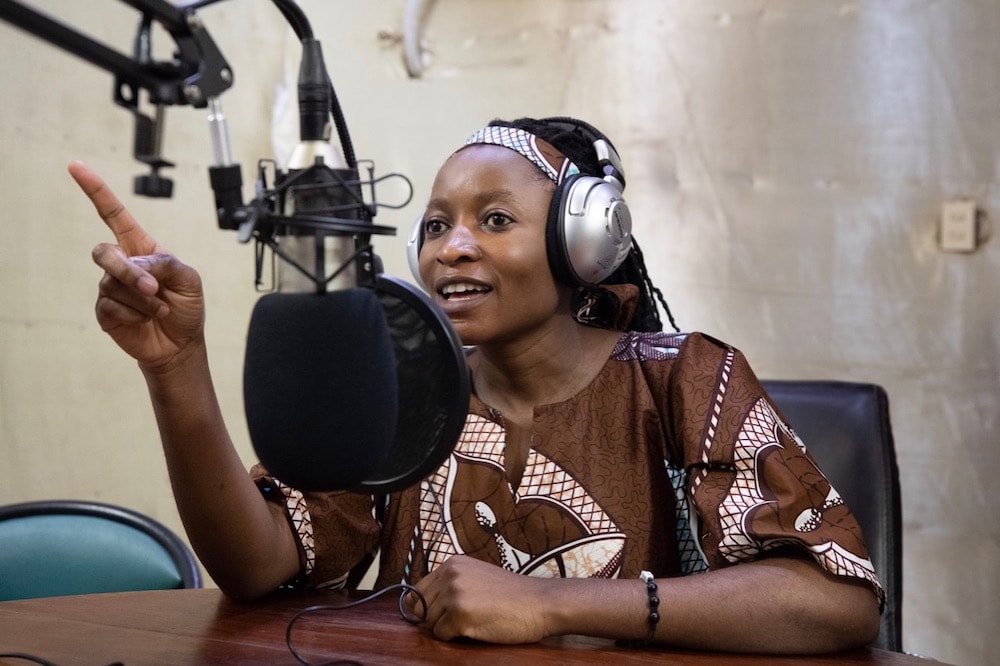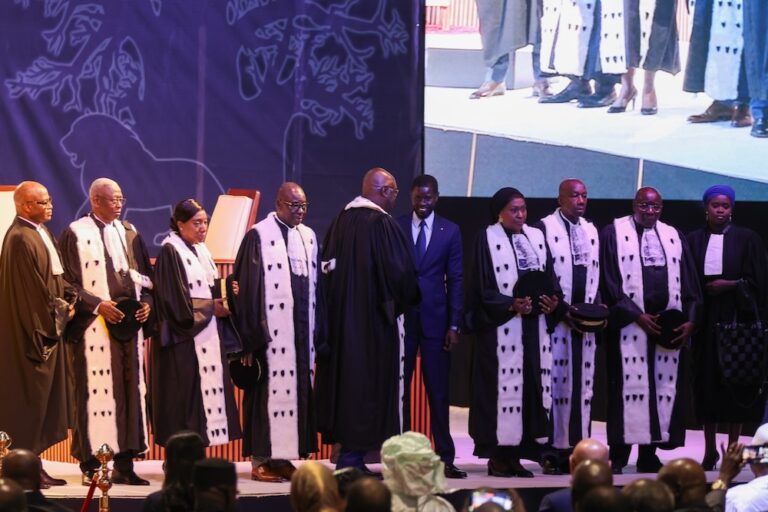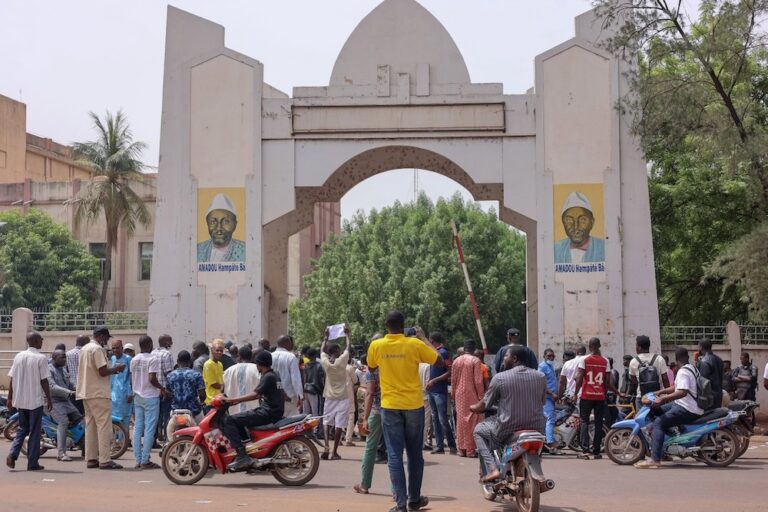February 2022 in Africa: A free expression round up produced by IFEX's Regional Editor Reyhana Masters, based on IFEX member reports and news from the region.
With a focus on #IWD2022, this brief winds its way through the continent with a focus on the Women In News sexual harassment survey, an emotional visit by UN Deputy Secretary General Amina Mohammed to Ethiopia, and an interactive fiction game that centres on keeping young women safe online.
For the love of radio
During the month of love and romance, the African continent celebrated International Radio Day with swooning messages emphasising the role and importance of radio in the African context.
A love letter to radio by veteran Namibia broadcaster Norah Appolus took us through a nostalgic journey of communities and their affair with this much loved medium, and more importantly, highlighted the role of media in the context of liberation struggles.
The Media Foundation for West Africa (MFWA) reinforced the notion that in our context accessibility, affordability, and real-time delivery of news and information, especially in local languages, has made radio the medium of choice, even in the modern era of the internet.
Edetaen Ojo of the Africa Freedom of Expression Network (AFEX) reminded us that: “despite advances in information and communication technologies, the radio, in its different forms, remains a trusted and most accessible medium of communication for millions of people on the African continent and beyond, giving them a voice and serving as a veritable source of information.”
This year’s International Women’s Day theme replete with a #BreakTheBias pose – is pressing for action to level the playing field for women and pushing the notion of “commitment to calling out bias, smashing stereotypes, breaking inequality, and rejecting discrimination.”
As gender activists find ways to disrupt inequality, Nigerian creative Obialunamma Efemena Omekedo explained how feminists across Africa see radio as a tool to bridge the gender divide, using it strategically to “amplify messages and issues that may contribute to behavioural change and shifting of power for women and girls.”
In a piece for iSPEAK Africa, Omekedo explains: “Nigerian radio programming has also recognised the need for focusing the lens a little more intentionally – so that contemporary topics such as feminism, intersectionality, dismantling of patriarchy and shifting power for women are highlighted.”
Sexual Harassment Survey
A subject that is often dismissed on the African continent was brought onto centre stage by Zimbabwe’s Minister of Information, Publicity and Broadcasting Monica Mutsvangwa, when she promised that her ministry will “do more to engage media regulatory authorities and heads of media houses to actively put in places measures to stop sexual harassment in the media space.”
Mutsvangwa was speaking at the virtual launch of the WAN-IFRA WIN leadership accelerator 2022 programme, on 24 February.
Her promise was in reference to the shocking statistic that one in every two women working in the media sector has experienced some form of sexual harassment, revealed in WAN-IFRA’s survey of sexual harassment in eight African countries, carried out with the Women in News (WIN) initiative and the City University of London.
Also highlighted in the survey was the disturbing disconnect between the respondents and their managers, which points to the need for media outlets to set up clear-cut mechanisms for reporting sexual harassment as well as follow up actions.
As WIN recommends: “It all starts with a conversation on what is and isn’t acceptable behaviour in your media organisation – being explicit about sexual harassment – sharing definitions, what behaviours are unacceptable, and communicating the right for every employee to be treated equally. It is not enough to have a policy; staff and managers must be trained on what the procedures are for making and managing a complaint.”
Strong emotions and calls for accountability
The rape and torture of women caught up in Ethiopia’s civil war was back in the spotlight following United Nations Deputy Secretary General Amina Mohammed’s visit to Tigray, Amhara, Afar and Somali regions in the north of the country.
Describing how there were moments when she and many members of the entourage, including the translators, held back their tears, Mohammed said: “in your worst nightmares, you cannot imagine what has happened to the women in Ethiopia. . . . I don’t know how they managed to tell us again the stories of the atrocities that were committed against them, whether they were gang rapes or rapes of women that had just come out of caesarean sections or had had these rapes in front of their children, I don’t know how they managed to tell us that.”
During her press briefing in New York following her visit, Mohammed emphasised the need for accountability: “I think, without a shadow of a doubt, justice and accountability have to be had. I think that’s very much part of, up-front centre of the national dialogues.”
This view is reinforced in the recommendations being made by Human Rights Watch (HRW) and Amnesty International (AI) in their respective reports – I Always Remember That Day and I Don’t Know If They Realised I Was A Person. The two reports, which comprehensively document the personal stories of young girls and women sexually violated during Ethiopia’s civil conflict, also offer a host of recommendations for relevant stakeholders including the Ethiopian government, the Tigray Peoples’ Liberation Front, aid agencies, various UN bodies, and humanitarian agencies.
One of the recommendations made by HRW is that the Ethiopian government “make public the findings of the task force set up by the minister of women, children and youth to investigate accounts of sexual violence in Tigray”, while AI recommends the government: “ensure that allegations of sexual violence perpetrated since the outbreak of the conflict in the Tigray region are promptly, effectively, independently and impartially investigated, and bring those suspected of criminal responsibility to justice in open, accessible civilian courts in full compliance with international standards for fair trial without recourse to the death penalty. Where appropriate, those suspected of committing rape or sexual slavery should be investigated for the war crimes and crimes against humanity of rape, sexual slavery, torture and persecution.”
Making online civic space safe for young women
Moving beyond invite-only digital security training sessions, Pollicy.org and Paradigm Initiative joined forces to create a new interactive fiction game, Digital SafeTea aimed at helping young African women stay safe online.
Available in English, Swahili and Luganda, the game allows players to step into the world of three young women: Goitse, Aisha and Dami. “They are faced with digital threats like zoom bombing, impersonation, and even Non Consensual Sharing of Intimate Images (NCII) which is often referred to as ‘revenge porn’. As players weave through the maze of threats, they are presented with lessons on how to navigate such threats in real life.”
LGBTQIA+ under attack in West Africa
The reputation that West African nations Senegal and Ghana have as Africa’s most progressive in terms of democratic systems and high levels of tolerance is fast fading, as both countries’ governments tighten the noose on LGBTQIA+ rights. Taking advantage of the popularity of religiously driven sentiment, opposition parties from each country have introduced Private Members Bills.
Senegal’s parliament threw out an anti-LGBTQIA+ bill proposing stiffer jail sentences for homosexuality in December, on the basis that there was already an adequate law in place. But homophobic sentiment in Senegal is on the rise, as evidenced by protestors holding offensive placards, marching through the capital city Dakar, and demanding harsher laws for homosexuality towards the end of February. Led by conservative Muslim groups, thousands of men expressed their objection to parliament’s withdrawal of the bill.
Meanwhile, in Ghana, public hearings on the Promotion of Proper Human Sexual Rights and Ghanaian Family Values Bill 2021 are ongoing and being closely monitored by LGBTQI+ rights organisation Rightify Ghana. The Bill was initially introduced by Ghanaian members of Parliament in 2021 with the first public hearing by the Constitutional, Legal and Parliamentary Affairs Committee of Parliament committee held on 11 November, 2021.
The particularly odious and punitive Bill criminalises same-sex relationships and marriages, bans gender reassignment surgery and supports gender conversion therapy. The Bill, which has a high chance of being passed into law, “seeks to criminalise the production, procurement, marketing, broadcast, dissemination, publication, or distribution of materials concerning so-called “LGBTTQQIAAP+ propaganda, advocacy, support and other promotional activities through any medium and would also seek to prohibit any show of support, sympathy for or change of public opinion toward acts prohibited under the bill.”
Groups in both countries warn that these laws will lead to a continued rise in attacks and arrests of persons who identify as LGBTQIA+, as was experienced in 2021.
The Electronic Frontier Foundation is urging Meta and Twitter to “publicly speak out against the proposal and state what action they will take to protect users should the legislation pass.”
Calling out Ghana
The sentencing of Ghanaian journalist Oheneba Boamah Bennie to two weeks in jail for contempt of court and the assault of journalist Eric Nana Gyetuah by police officers within the same week in February are indicative of a larger crisis.
In the first of a two-part blog, executive director of Media Foundation for West Africa (MFWA) Sulemana Braimah explains how: “the apparent crisis at hand represents a toxic mix that has the potential to undermine media freedom and freedom of expression in Ghana. It also has the potential to reverse Ghana’s modest gains towards democratic consolidation, peace and security.”
Through its monitoring of the media content project, MFWA has noted unprofessional and reckless behaviour by some media houses in allowing offensive, provocative and unsubstantiated allegations to pass. At the same time, violations against the media are on the rise, and those crimes are going unpunished. Of particular concern is the unsolved murder of Ahmed Hussein Suale, dating back to 2019, and the recent attack on Ada FM in January 2022 by unknown assailants.
In a strongly-worded letter, Braimah quotes statements President Akufo-Addo made before he was elected president, reminding him of his opposition to repressive media laws such as criminal libel.
Braimah ends his letter saying that: “We cannot love media freedom in opposition and oppress it when in power. We cannot love democracy and hate free speech. When free speech dies, democracy dies.”
In brief
Reporters Without Borders (RSF) are requesting the Chadian authorities to investigate the circumstances around the death of journalist Evariste Djaï-Loramadji. Soon after filing a report on the attack on a village of farmers by local herdsmen for Radio Lotiko, he went offline. His body was found the next day.
The Media Rights Foundation (MRA) strategy of pursuing justice and seeking endorsement of Nigerian media freedom rights through the courts directly resulted in two victories this month. First, the ECOWAS Community Court of Justice dismissed a motion by the Federal Government of Nigeria, seeking to prevent it from delivering its judgment on the four consolidated suits challenging the Government’s 2021 decision to suspend Twitter in Nigeria. In the second instance, MRA was granted permission to sue the Attorney General of the Federation and Minister of Justice over his failure to implement Nigeria’s Anti-Torture Act.
Again in Nigeria, a federal court has concluded that the denial of information to sports journalist Godsgift Onyedinefu constituted a violation of her constitutionally guaranteed right to information. The Federal Ministry of Finance and the Federal Ministry of Youth and Sports Development were both ordered to pay approximately US$4800 for refusing to provide her with information she had requested about the cost of Nigeria’s participation in the 2018 World Cup.
South Sudan was a hotspot this month as National Security Service intelligence agency officers arrested eight journalists, covering a press conference that included members of opposition parties. Earlier in the month, a team from the Association of Media Development in South Sudan (AMDISS), led by Michael Duku, almost lost their lives when they were caught up in violent clashes between communities in the Western Bahr el Ghazal State, 800 kilometres from the capital, Juba.
Four IFEX members – The Gambia Press Union (GPU), The International Press Centre (IPC), the Centre for Media Studies and Peace Building (CEMESP) and MFWA, joined rights based organisations in the region in petitioning Guinea-Bissau’s President Umaro Sissoco Embaló to improve the media freedom landscape and thoroughly investigate serious media rights violations.



